
The persimmon is the edible fruit of a number of species of trees in the genus Diospyros. The most widely cultivated of these is the Asian or Japanese persimmon, Diospyros kaki. Diospyros is in the family Ebenaceae, and a number of non-persimmon species of the genus are grown for ebony timber. In 2019, China produced 75% of the world total of persimmons.
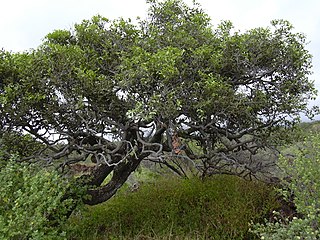
The Ebenaceae are a family of flowering plants belonging to order Ericales. The family includes ebony and persimmon among about 768 species of trees and shrubs. It is distributed across the tropical and warmer temperate regions of the world. It is most diverse in the rainforests of Malesia, India, tropical Africa and tropical America.
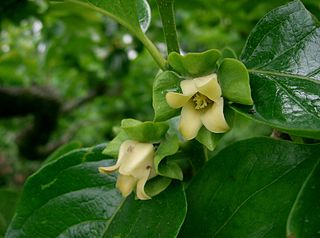
Diospyros is a genus of over 700 species of deciduous and evergreen trees and shrubs. The majority are native to the tropics, with only a few species extending into temperate regions. Individual species valued for their hard, heavy, dark timber, are commonly known as ebony trees, while others are valued for their fruit and known as persimmon trees. Some are useful as ornamentals and many are of local ecological importance.

Diospyros virginiana is a persimmon species commonly called the American persimmon, common persimmon, eastern persimmon, simmon, possumwood, possum apples, or sugar plum. It ranges from southern Connecticut to Florida, and west to Texas, Louisiana, Oklahoma, Kansas, and Iowa. The tree grows wild but has been cultivated for its fruit and wood since prehistoric times by Native Americans.

Diospyros melanoxylon, the Coromandel ebony or East Indian ebony, is a species of flowering tree in the family Ebenaceae native to India and Sri Lanka; it has a hard, dry bark. Its common name derives from Coromandel, the coast of southeastern India. Locally it is known as temburini or by its Hindi name tendu. In Odisha, Jharkhand, and Assam, it is known as kendu. The leaves can be wrapped around tobacco to create the Indian beedi, which has outsold conventional cigarettes in India. The olive-green fruit of the tree is edible

Diospyros nigra, the black sapote, is a species of persimmon. Common names include chocolate pudding fruit, black soapapple and zapote prieto. The tropical fruit tree is native to Mexico, Central America, and Colombia. The common name sapote refers to any soft, edible fruit. Black sapote is not related to white sapote nor mamey sapote.
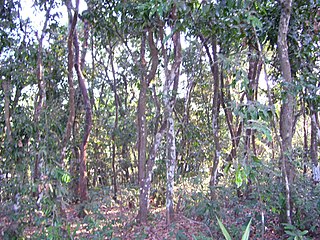
Diospyros ebenum, or Ceylon ebony, is a species of tree in the genus Diospyros and the family Ebenaceae. The tree produces valuable black wood.

Diospyros discolor is a tree of the genus Diospyros of ebony trees and persimmons. Its edible fruit has a skin covered in a fine, velvety fur which is usually reddish-brown, and soft, creamy, pink flesh, with a taste and aroma comparable to a peach. It is indigenous to the Philippines, where kamagong usually refers to the entire tree, and mabolo or tálang is applied to the fruit.

Diospyros pentamera is a common rainforest tree in the Ebony or Persimmon family (Ebenaceae) growing from near Batemans Bay in New South Wales to the Atherton Tableland in tropical Queensland, Australia. It is commonly known as the myrtle ebony, black myrtle, grey plum or grey persimmon.
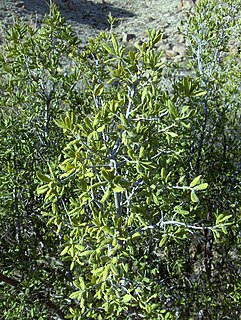
Diospyros texana is a species of persimmon that is native to central, south and west Texas and southwest Oklahoma in the United States, and eastern Chihuahua, Coahuila, Nuevo León, and Tamaulipas in northeastern Mexico. Common names include Texas persimmon, Mexican persimmon and the more ambiguous "black persimmon". It is known in Spanish as chapote, chapote manzano, or chapote prieto, all of which are derived from the Nahuatl word tzapotl. That word also refers to several other fruit-bearing trees.

Diospyros crassiflora, commonly known as Gabon ebony, African ebony, West African ebony, and Benin ebony is a species of lowland-rainforest tree in the family Ebenaceae that is endemic to Western Africa. It is named after the West African state of Gabon, though it also occurs in Cameroon, Central African Republic, Republic of the Congo, Democratic Republic of the Congo, Equatorial Guinea and Nigeria.
Diospyros abyssinica is a tree species in the family Ebenaceae which is native to Sub-Saharan Africa.
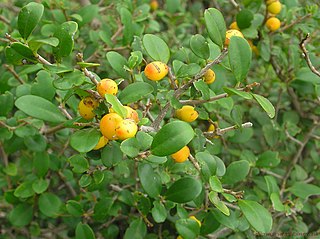
Diospyros ferrea, known as black ebony, is a tree in the ebony family, distributed in Burma (Myanmar), Cambodia, India, Indonesia, Malay Peninsula, Philippines, Sri Lanka, Thailand and Laos (Khammouan).
Diospyros frutescens is a tree in the family Ebenaceae. It grows up to 18 metres (60 ft) tall. Twigs dry to blackish. Inflorescences bear up to 10 flowers. The fruits are round, up to 20 mm (0.8 in) in diameter. The specific epithet frutescens is from the Latin meaning "shrubby" in this context, referring to the tree's growth style. The habitat is mixed dipterocarp forests from sea-level to 800 metres (2,600 ft) altitude. D. frutescens is found in Thailand, Vietnam and west to central Malesia.
Diospyros hirsuta is a tree in the ebony family endemic to Sri Lanka.
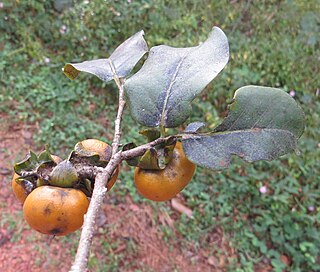
Diospyros montana, the Bombay ebony, is a small deciduous tree in the ebony family up to 15 metres (49 ft) tall, distributed all along the Western Ghats of India, Sri Lanka, Indo-China through to Australia.

Diospyros revaughanii is a rare species of tree in the family Ebenaceae (ebony).
Diospyros leucomelas is a species of tree endemic to Mauritius.
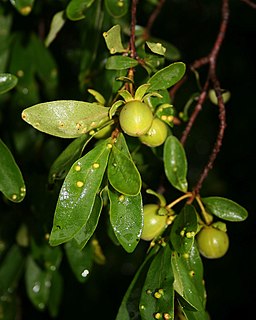
Diospyros lycioides, commonly called the bushveld bluebush, is a species of African Diospyros, trees and shrubs in the family Ebenaceae. It is native to central and southern Africa, except the winter-rainfall area. It grows in Australia and is known as a weed there. Many parts of the plant are used: the wood, the roots and stems for toothbrushes, the fruits for alcoholic drinks, and the roots and bark in traditional medicine.















